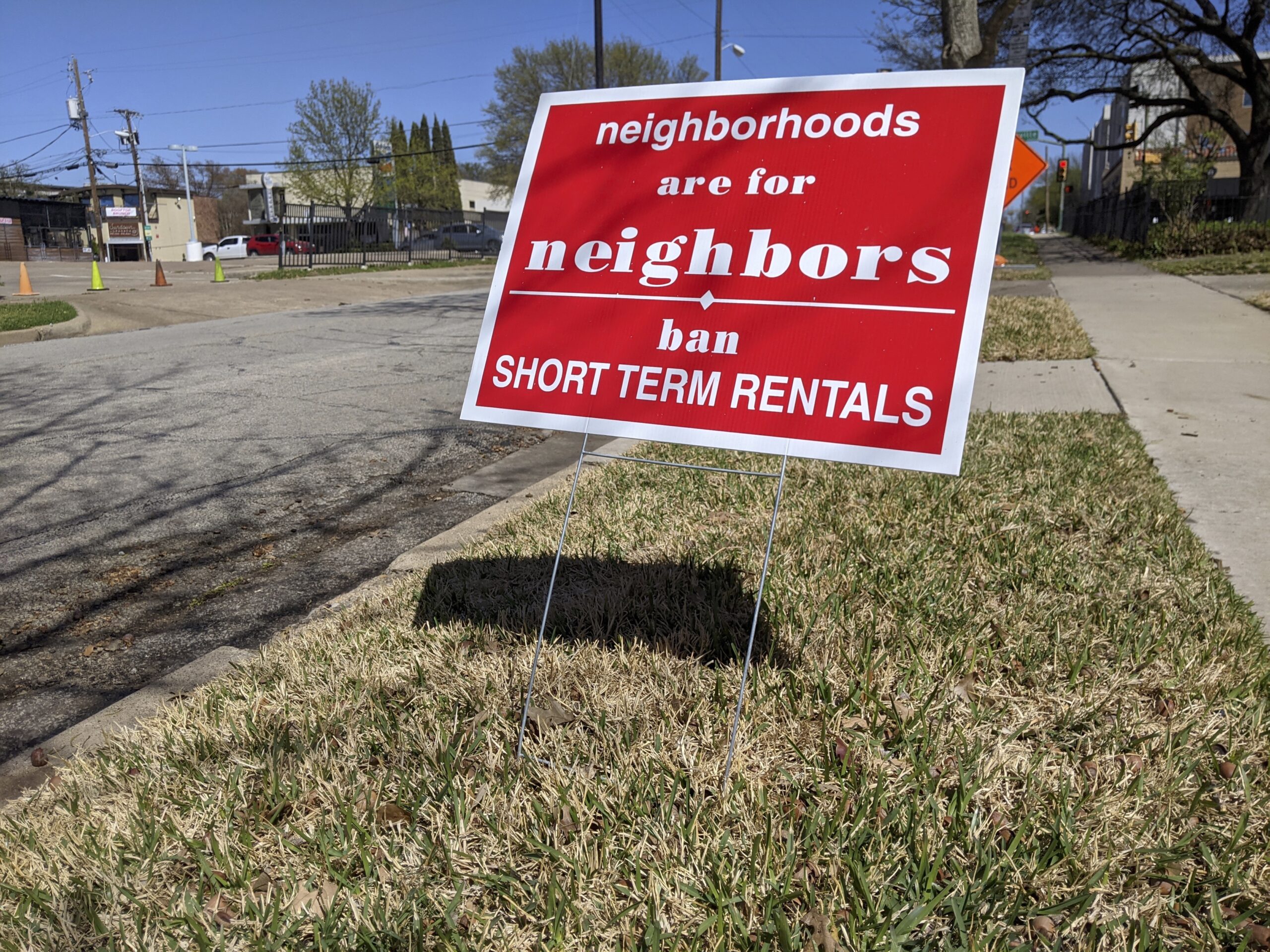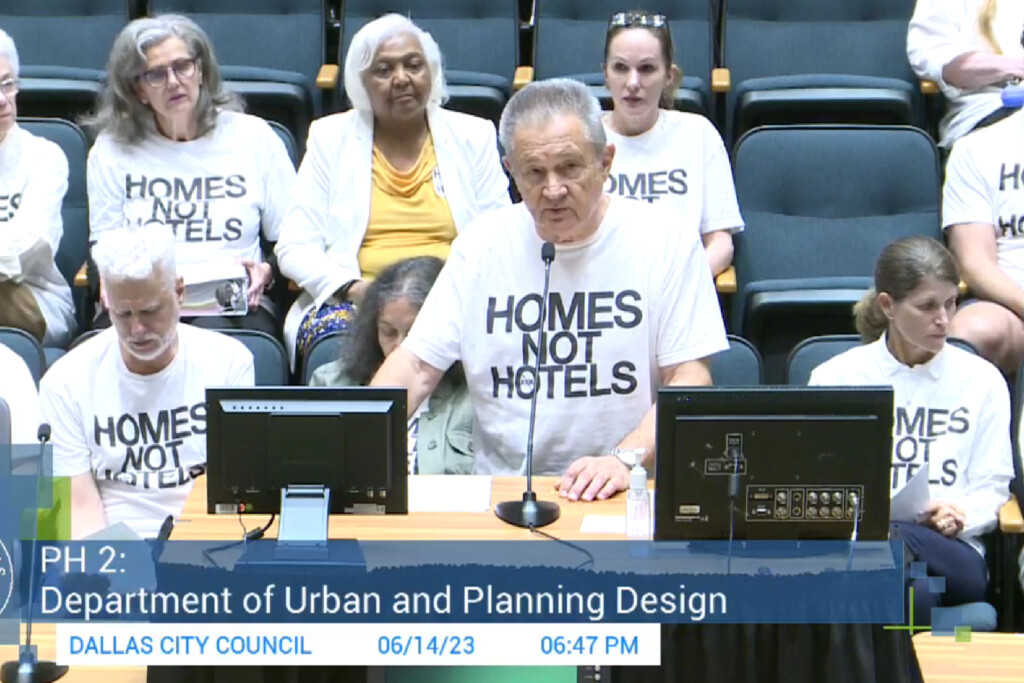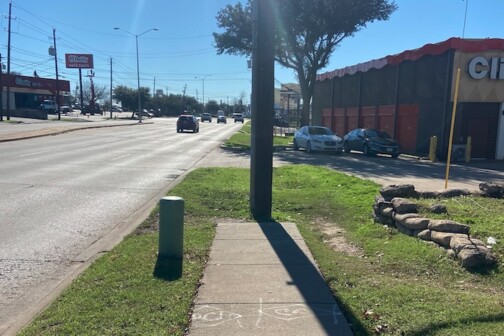Dozens of attendees in the gallery of the Dallas City Council chambers spent their Wednesday waiting for a pair of measures that would drastically change the short-term rental industry in the city.
At the end of a nearly five-hour debate, Council approved zoning that automatically makes 1,154 Airbnbs, Vrbos, and other short-term rentals illegal in single-family residential neighborhoods. Council also passed an ordinance that will provide the city’s code compliance team with a set of rules to apply to the roughly 300 STRs operating in multifamily residential areas. There could be as many as 3,000 more operating in the city without proper registration, spread across single-family and multifamily zoning districts.
Supporters of the ban branded their platform the Keep It Simple Solution, or KISS. That solution was to zone them out of single-family communities. Councilman Paul Ridley, of East Dallas, was their champion. He reiterated that short-term rentals are bad for neighborhoods, something he’s said many times over the past years of discussion.
“It is time to take decisive action to preserve the quality of life in Dallas neighborhoods and not to delay any longer what our residents tonight and previously have been clamoring for,” he said.
Before the discussion, City Manager T.C. Broadnax defended the work of city staff, which issued a late recommendation to allow STR operations with additional regulations. That recommendation largely failed.
“Unfortunately, there is no solution that is going to please everyone and we know that,” Broadnax said. “This is a challenging issue, and we have done our best to work towards a sensible solution, not a perfect one.”
The 12-3 vote will allow short-term rentals in commercial areas and caps how many can operate in multifamily, which are defined as plots of land upon which more than one housing unit is located. The rentals are banned in buildings with fewer than 20 units and can only occupy 3 percent of the units in larger developments. For commercial zoning, no more than 20 percent of a building can be used as short-term rentals.
This has been a debate filled with tension. But around 10 p.m., it became clear that some version of the KISS option would be passed. At that point, the council members who lobbied hardest for the measure visibly relaxed. They accepted concessions that banned the operations in single-family residential while allowing caps in other zoning districts. (In addition to Ridley, the most vocal supporters of a ban included Preston Hollow’s Gay Donnell Willis, Far North Dallas’ Cara Mendelsohn, east and southern Oak Cliff’s Carolyn King Arnold, and West Dallas’ Omar Narvaez.)
Council members Chad West and Adam Bazaldua attempted to soften the blow of the KISS option by grandfathering in existing, registered STRs that were current on their hotel tax payments. They also pushed a provision that would allow STRs in single-family residential if a caretaker was on site.
Both members said that responsible operators were being punished by the actions of a few bad ones. They argued that it would be more financially responsible for the city to retain those owners and continue to collect fees and taxes.
West also said he felt that the zoning wouldn’t hold up in court or against a state legislature that is seemingly trending toward bills that hamper local control.
“I don’t think it will stand up in federal court and there’s a strong chance the state legislature will pass laws in [2025] overturning STR bans,” said West. “Either situation will put us right back where we are today with unchecked, problematic short-term rentals in our neighborhoods.”
All of those attempts failed to capture a majority of the horseshoe, with the move to grandfather existing single-family neighborhood operators in failing by the slimmest of margins, 8-7.
The zoning and regulations go into effect immediately, but operators have six months to get into compliance. The ordinance also requires a City Council committee to review it in 2025.
City staff questioned whether it could handle the additional enforcement needed to locate and shut down thousands of short-term rentals. Code officers currently work from 6 a.m. to 7 p.m. Willis and Ridley both said they felt that concern was overstated. Ridley suggested that there was software available to assist with monitoring the situation.
“Enforcement can begin in a mailbox,” Willis said. “In fact, the city already uses this method to notify and warn suspected operators and bring them into compliance.” She added that she thought residents would “be happy” to help report suspected STRs, too.
Ridley suggested the city invest in software created by the company Granicus.
“The solution is to outlaw and police that with the software services of companies like Granicus that can identify and establish that they are illegal land uses,” Ridley said. “All we have to do is send them a letter and tell them to cease and desist.”
The city will determine how to pay for enforcement at a future meeting. The item in question contained a council resolution to allocate just under $1 million toward enforcement measures. During a briefing in April, city staff told the council that a ban on STRs would require an annual expense of $1.4 million for nine new employees in code enforcement. The ban will generate $40,000 in revenue from fees and taxes; in the past seven months, Dallas has collected more than $2 million from STR operators, according to the city controller.
“It is time to take decisive action to preserve the quality of life in Dallas neighborhoods.”
Councilman Paul Ridley
Proponents of the Keep It Simple Solution lobbied passionately prior to the council’s discussion. Sixty people signed up to speak for or against. Most wore white shirts emblazoned with “Homes Not Hotels” in black lettering. State Reps. (and Dallas residents) John Bryant and Jessica Gonzalez spoke in support of the measure, and Zarin Gracey, who just won the District 3 runoff in southwest Dallas to replace the term-limited Casey Thomas, was seen sporting one of the shirts and listening in the crowd.
As the debate on the topic reached its fourth hour, Mendelsohn looked out at the crowd still present after a marathon day.
“I have never seen anything unite the city of Dallas more than joining together to oppose short-term rentals,” she said, wearing her own white t-shirt beneath a pink blazer. “You’ve all come down here together with a clear, united voice together as neighbors to oppose short-term rentals in your neighborhoods.”
Local STR operators pleaded that the council to keep in mind that they had done what the city had asked by paying hotel occupancy taxes. They contended that they made efforts to ensure their renters weren’t proving to be a disruption.

“Zoning STRS out of existence in residential neighborhoods is not going to create better neighbors or better neighborhoods,” said Lisa Seviers, who owns two properties. “Crime happens in every time of housing in every neighborhood. STRs are a convenient scapegoat.”
Ashley Martzen said she lives in the same neighborhood as her STR properties. She spoke remotely from one of her listings, where a family and their pets were staying because work on their house was not yet complete.
“You can’t tell me a hotel is a solution for that,” she said. “It’s just not.”
Several others, including Patrick Block, said their STR income helped them care for aging parents and stay in family homes. Block said he moved into his childhood home in East Dallas to be closer to his ailing mother, who lives in Juliette Fowler Communities on Abrams Road, and rents out the guest room to help cover the costs of her care.
“Getting a long-term roommate is not an option for me,” he said. “If can’t rent the room, I can’t afford my mother’s care, and I may have to sell the house.”
Those lobbying for the zoning change painted owners as largely corporate. They were unsympathetic toward operators, regardless of their reasons for joining the market.
“The smallest STR operators you’re trying to protect so hard took a risk to launch businesses in violation of existing zoning,” said Olive Talley, an outspoken organizer in support of the ban. “The small guys are not the drivers of the STR gold rush. They are the faces that the big operators are hiding behind.”
Several speakers who came to support the KISS zoning option warned council members to remember who voted them into office.
Anga Sanders used her time at the microphone to tell Council that they had “been had … hoodwinked, bamboozled, run amok, and led astray” by short-term rental platforms.
“You came to us, you stood on our front porches in your bright campaign t-shirts, clutching door hangers in your hand and your campaign signs under your arm, and you asked us for the privilege of representing us,” she said.
At least two council members—Councilman Jesse Moreno and Councilwoman Jaynie Schultz—seemed to take that to heart. They acknowledged that they weren’t in favor of the zoning change, but they also weren’t willing to circumvent the will of their constituents.
“Let me be clear, the KISS approach does not help better protect neighborhoods nor does it help with our housing supply,” Schultz said before her vote.
For better or for worse, Dallas has made a decision on STRs after four years of discussion and analysis. What will likely follow, rental operators said, is litigation.
Block said the move would cost taxpayers money—and not just in enforcement.
“One thing I have not heard discussed is the potential cost to Dallas for the regulatory taking of property,” he said. “Per the Texas Supreme Court, this (short term rentals) is an allowed use of my home. People hosting in their homes are eligible for reimbursement for the loss of income.”
“Any ban that does not grandfather in current operators seems destined for a long legal battle,” said AJ Johnson, an STR owner and attorney.
At least one council member seemed unfazed by that thought.
“I’m just saying, I don’t fear courts,” said Councilwoman Carolyn King Arnold. “Let’s dress up and go.”
Get the D Brief Newsletter
Author





